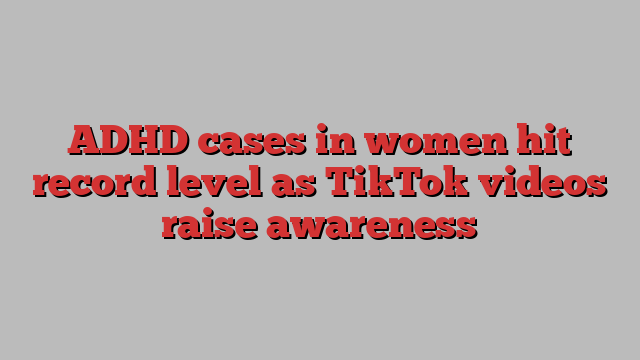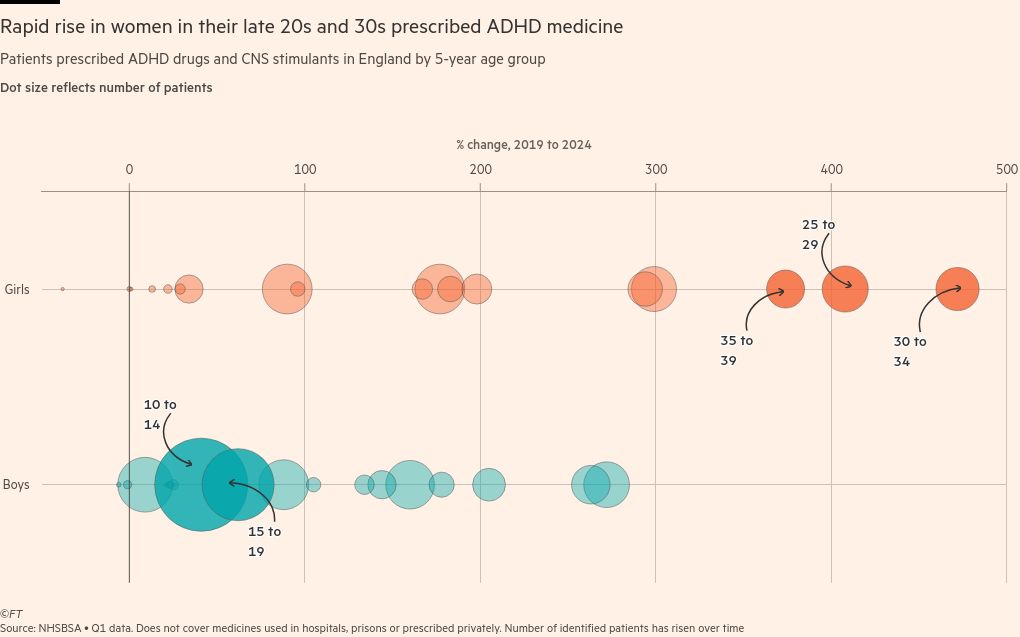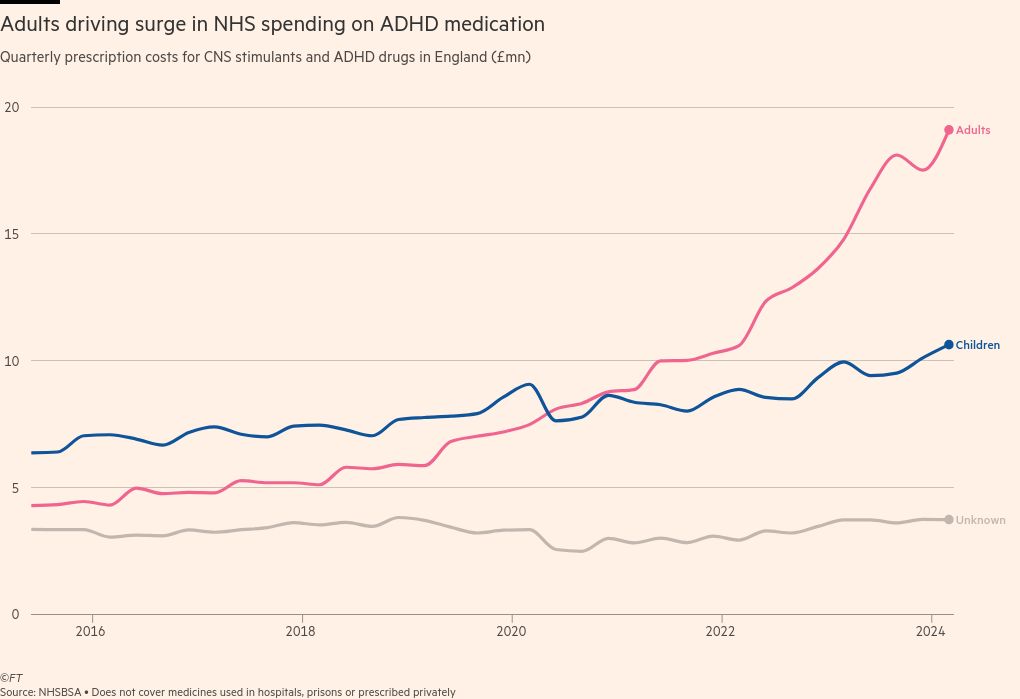
Unlock the Editor’s Digest for free
Roula Khalaf, Editor of the FT, selects her favourite stories in this weekly newsletter.
A rising awareness of ADHD in young women driven by TikTok has seen prescriptions for the condition typically associated with boys hit record levels in England.
In the first quarter of 2024, there were 19,400 women aged 25 to 34 prescribed medication for attention deficit hyperactivity disorder, more than five times as many patients as at the start of 2019, according to an FT analysis of NHS prescription data for England.
ADHD is typically characterised by fidgeting and impulsiveness, but clinicians said the surge in diagnoses reflected growing recognition that symptoms often present differently in women and girls.
The data comes amid a global drug shortage and ballooning demand for assessments, with ADHD being the second-most viewed condition on the NHS website last year after Covid-19.
Growing recognition has been driven by social media platforms such as TikTok, where videos tagged #adhd have received 2bn UK views in the past year alone.

Dr Catherine Durkin, joint lead for women and mental health at the Royal College of Psychiatrists, said ADHD remained underdiagnosed, particularly in women and girls.
“Many more people are talking about it on social media, which is incredibly positive and actually helps to signpost lots of patients [towards ADHD services],” she said.
“Different social expectations are placed on women and girls so they are more prone to internalising symptoms, which tends to spill over into experiencing other mental health disorders and often leads to misdiagnosis.”
Studies in the US show rates of attempted suicide and self-harm are more than twice as high in girls with ADHD than their peers.
Durkin added that understanding of neurodiversity in women was still “in its infancy” and that far more research into areas such as the impact of hormones on symptoms was needed.
The medication used to treat ADHD is highly effective, making it one of the most treatable conditions. However, manufacturing issues that began at the end of last year have prevented doctors from starting new prescriptions, affecting access for many existing patients.
Despite this, the NHS spent a record £126mn on stimulants and other ADHD medication in the year ending March 2024, with adult prescriptions accounting for the majority of spending for the second year running.

Teenage boys still have the highest diagnosis rates, but there has been a marked rise in professional workers seeking treatment in recent years.
An FT analysis of NHS Business Services Authority data found that prescriptions for the most affluent patients increased at twice the rate of the most deprived fifth of the population between May 2020 and September 2023.
Dr Uthish Sreedaran, clinical director at Psychiatry UK, one of the UK’s largest providers of ADHD services, said improved understanding of the condition had encouraged more professionals to seek diagnosis.
“These high-flying individuals will have coping strategies to protect themselves, such as setting five alarms for a meeting or working extreme hours, but during a period of transition or stress that all comes tumbling down,” he said.
The surge in demand for ADHD services has led to waiting times of more than a decade for adults in some parts of England.
In a bid to address the backlog for assessments many health boards are turning to private providers, with nine new contracts signed over the past year for ADHD assessment and waiting list services, according to FT analysis of figures from data provider Tussell.
Psychiatry UK has contracts with five health boards but patients across England can access its services through the NHS Right to Choose pathway, which was set up to stop the postcode lottery for ADHD treatment.
It said it suspended new private referrals a year ago to prioritise NHS patients, which increased 230 per cent between 2022 and 2023, but waiting times for assessments are still advertised as between 12 and 18 months.
There are at present no guidelines on maximum waiting times for a diagnosis or established data sets to monitor national standards.
Dr Durkin said there was a need for “targeted investment” to expand capacity as well as regular publication of waiting list data to show the scale of the challenge facing ADHD services.
“The government has an important opportunity to improve care for thousands of people with ADHD, although this will take time as many ADHD services are struggling to manage soaring demand,” she added.
Henry Shelford, chief executive of charity ADHD UK, said the lack of government action was a “dereliction of duty and a wasted opportunity”.
“The opportunity is both moral and economic,” he said. “Identification and support is commonly life-changing . . . [It] takes people from benefits to employment and others from underachieving to achieving their potential.”
NHS England said: “Patients are waiting too long for an ADHD diagnosis, which is why the NHS has launched an independent expert task force which will investigate the challenges facing ADHD services and help them manage the rising numbers of referrals.” The task force is expected to report back later this year.
The Department of Health and Social Care said that integrated care boards were responsible for commissioning ADHD services in line with National Institute for Health and Care Excellence guidelines.
“We know there are delays in ADHD diagnosis as part of a broken NHS and we will work to fix this,” it added.